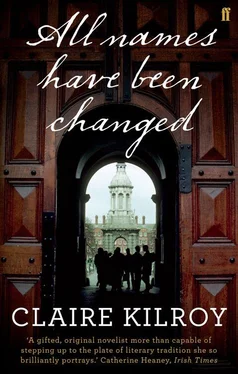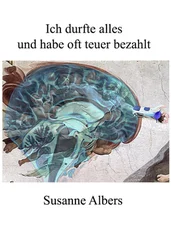Claire Kilroy - All Names Have Been Changed
Здесь есть возможность читать онлайн «Claire Kilroy - All Names Have Been Changed» весь текст электронной книги совершенно бесплатно (целиком полную версию без сокращений). В некоторых случаях можно слушать аудио, скачать через торрент в формате fb2 и присутствует краткое содержание. Год выпуска: 2010, Издательство: Faber & Faber, Жанр: Современная проза, на английском языке. Описание произведения, (предисловие) а так же отзывы посетителей доступны на портале библиотеки ЛибКат.
- Название:All Names Have Been Changed
- Автор:
- Издательство:Faber & Faber
- Жанр:
- Год:2010
- ISBN:нет данных
- Рейтинг книги:5 / 5. Голосов: 1
-
Избранное:Добавить в избранное
- Отзывы:
-
Ваша оценка:
- 100
- 1
- 2
- 3
- 4
- 5
All Names Have Been Changed: краткое содержание, описание и аннотация
Предлагаем к чтению аннотацию, описание, краткое содержание или предисловие (зависит от того, что написал сам автор книги «All Names Have Been Changed»). Если вы не нашли необходимую информацию о книге — напишите в комментариях, мы постараемся отыскать её.
All Names Have Been Changed — читать онлайн бесплатно полную книгу (весь текст) целиком
Ниже представлен текст книги, разбитый по страницам. Система сохранения места последней прочитанной страницы, позволяет с удобством читать онлайн бесплатно книгу «All Names Have Been Changed», без необходимости каждый раз заново искать на чём Вы остановились. Поставьте закладку, и сможете в любой момент перейти на страницу, на которой закончили чтение.
Интервал:
Закладка:
Were he a less volatile man, or better equipped to grieve, or simply capable of taking good advice, Glynn might have been moved by the occasion of Tobias’s sudden passing to compose another essay for the TLS , this time reflecting on the brevity of life and the foolish vanity of the ego — the two old friends had fallen out over a mere book title, after all, a weak one at that. Glynn conspicuously failed, however, to express his regret at Tobias’s untimely death, leading to a deep-seated bad feeling toward him in the London publishing houses which endures to this day. Wherever Glynn went, the sound of slamming doors followed. Doors slammed by him, doors slammed on him.
Glynn’s uncharacteristic taciturnity in the wake of Tobias’s death was, as Antonia pointed out, his own choice. Nobody forced him to keep his mouth shut. No one had twisted his arm. ‘He’s old enough and ugly enough, etc.,’ were Antonia’s exact words, being a woman who favoured the use of abbreviations in speech. She adopted a heightened faux-naturalistic style when expressing herself, mentally passing her conversation through a filter that converted her initial choice of words into the colloquial dialogue of a contemporary novel. Perhaps it was an attempt to counterbalance the horsy vowels of her accent, about which she was defensive in our low company, you could tell. That’s my theory at least.
Her self-conscious mimicry of the patterns of natural speech set me to thinking that Antonia was not revealing her true self to us but, instead, displaying some class of literary construct that she had concocted at home, demonstrating how all-consuming her desire to be a writer was, but nobody, if you listen closely, speaks the way characters in novels speak. Were you to transcribe an overheard conversation, it would read as contrived. The impression of verisimilitude created by a fine writer is an illusion, just as old masters succeed in making paint look more like skin than skin. Somehow, ineffably, the artifice transcends itself to become art. This uncommon ability to render the vision of the imagination onto paper or canvas or the bars of a stave is just one of those unquantifiable transformative powers with which the monumentally gifted, like Glynn, are blessed.
Farm Animals , despite the unhappy circumstances of its publication, always had the effect of recalibrating my mind, making me wish I could add my voice to its chorus, the way a great song makes you want to join in and sing. I opened it to the prologue. Some idiot had underlined and asterisked the opening sentence in red biro and scrawled Cult of Self in the margin. ‘Shadows like rock pools,’ I read, ‘as cool and dark and alluring as—’ It was no good. I snapped the book shut.
Even the opening paragraph, which I knew by heart, was beyond my scope that day. I could not begin to access Glynn’s world, or the ‘liquid suspension of the fictional environment’, as he’d referred to it once in a keynote lecture delivered to an international conference on Irish literature in Stockholm. The full text was reproduced in a collection of essays I’d picked up for seven pence in a second-hand bookshop on Talbot Street otherwise jammed with Corgi paperbacks. The collection, In Finnegans Wake: Irish Fiction after Joyce , stood head and shoulders over its shelf-mates, high and solitary and most stern and, judging by the virginal condition of the spine, unread.
Although Glynn never acknowledged the influence of Joyce — he managed at that Stockholm conference to deliver a ninety-minute lecture on post-Joycean Irish fiction without mentioning the eponymous hero, such was the length of the Bloomsian shadow (Harold, not Leopold) that the big man cast over him — Joyce’s artistic enterprise was as indelibly stamped on Glynn’s imagination as Glynn’s artistic enterprise was stamped on mine. In fact, Giacomo Joyce , Joyce’s short prose-poem recounting his affair with one of his young language-school students in Trieste — a text I knew the moment I laid eyes on it would be one I’d return to throughout my life — could have been written by Glynn himself, such was the calibre of its erotic torment. ‘Easy now, Jamesy! Did you never walk the streets of Dublin at night sobbing another name?’ Yes he did, is the simple answer. Yes he did, and yes he would.
Though I intend the comparison with Joyce as praise of the highest order, it is not a compliment Glynn would appreciate. The truth of it was that Joyce would always have the following inalienable advantage over Glynn: that he had come first, that he was the original. Glynn could never fix that, no matter what he got up to, no matter how many stunts he pulled. Joyce was the primogeniture of Irish fiction, but Glynn did not regard himself as anyone’s baby, despite indulging in behaviour that strongly suggested otherwise.
I explained this theory to Antonia once, with not a little pride. ‘Geni tor , not geni ture , for the love of God, Declan,’ she scoffed, and inserted a cigarette between her painted lips. She flicked repeatedly at the crenulated wheel of her slim-line gold lighter, and cursed when the thing wouldn’t ignite. Instead of producing the box of matches rattling in my pocket, I smirked at her difficulty, and Antonia fucked the lighter at my face. I ducked, and it clipped my temple, and though it hurt I laughed. A big theatrical ha ha ha! Guinevere shook her head. ‘What’s wrong with you two?’ she muttered before walking off. Yes, there was a problem there right from the start; I don’t know how I missed it. Antonia, to her credit, had me down from the outset as a halfwit, and who was I to criticise her judgement of character? I, who, in the end, proved to be the worst judge of character of them all.
*
The tang of rotting seaweed was rank on the air that night. The level of the Liffey was unusually low. A chain of mudflats broke the oily black surface of the water like the spine of a cresting sea monster. The drinking had started early, the flagons of cider were out. I picked a path through urine trails and splashes of vomit. It was Halloween.
I turned down Eden Quay and crossed onto Marlborough Street. The bike I’d bought the first week of term was gone. I’d come down two hours after getting it home to find it had been stolen from under the stairs, and no evidence of a break in. There was nothing to be gained by replacing it, I knew that. Same thing would only happen again.
Bonfires studded the north inner city as if it had been shelled. Some of them were as tall as double-decker buses. The locals had been constructing those bonfires for weeks. They had so little to do, and so much to burn. I steered close to the streetlamps and clear of the corporation flats. Lines of washing waved frantically from the balconies as if the rooms behind them were on fire.
Two teenage boys ahead of me on Sean MacDermott Street were carrying a large cardboard box. They ducked behind a gap in a construction-site hoarding. Shouts of excitement greeted their arrival. I stopped and pulled the loose board open a fraction. It was difficult to say how many children were on the building site. Forty or fifty at least, leaping in silhouette against the flames. They swarmed around the two boys with the box.
One of the boys reached into the box and pulled out a black and white cat. He held it up by the scruff of its neck, brandishing it so that all the children could see, before placing it on the ground. The children descended. Whatever procedure they carried out made the animal scream. They released it and stood back.
The cat shot free, but a fizzling spark was attached to its rear. I squeezed through the hoarding and ran for it. The creature raced along the base of the far wall, then the banger exploded out of it. The rocket scudded along the rough ground like a stone skimming the surface of water. The children laughed as they jumped out of its path.
Читать дальшеИнтервал:
Закладка:
Похожие книги на «All Names Have Been Changed»
Представляем Вашему вниманию похожие книги на «All Names Have Been Changed» списком для выбора. Мы отобрали схожую по названию и смыслу литературу в надежде предоставить читателям больше вариантов отыскать новые, интересные, ещё непрочитанные произведения.
Обсуждение, отзывы о книге «All Names Have Been Changed» и просто собственные мнения читателей. Оставьте ваши комментарии, напишите, что Вы думаете о произведении, его смысле или главных героях. Укажите что конкретно понравилось, а что нет, и почему Вы так считаете.












